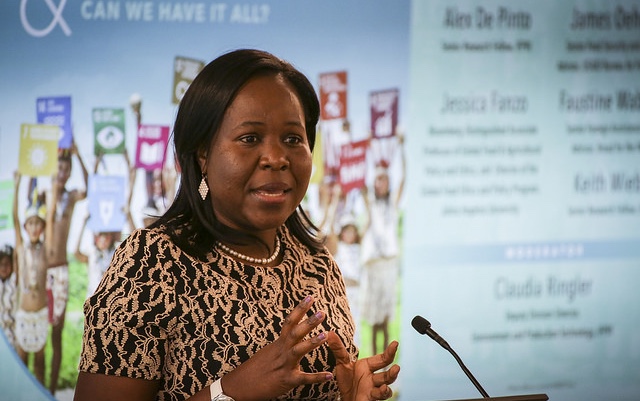With global leaders now meeting in Bonn for the annual UN climate summit (COP23), a recent IFPRI policy seminar wrestled with emerging problems of nutrition, agriculture, and living standards under climate change—posing the question, “Climate resilience, sustainable food systems, and healthy diets: Can we have it all?” Participants shared new insights on climate-smart agriculture (CSA), considered nutrition’s role in climate change mitigation and explored what actions are needed to build resilience in food systems while helping to meet the UN Sustainable Development Goals (SDGs).
The global poor sit in the path of climate disruption and must be the focus of mitigation efforts, participants agreed. “Climate-adverse events like hurricanes, floods, and droughts do not discriminate between poor and rich, but the poor are much more affected—they lose their livelihoods, they lose everything!” said Claudia Ringler, deputy director of IFPRI’s Environment and Production Technology Division.
It’s critical to consider climate change in the context of its big drivers, including changes in income, where people live, what they eat, and innovations in the production and distribution of food, said IFPRI Senior Research Fellow Keith Wiebe, as change in all of these will be accelerating in the decades ahead. While the world has made collective progress on food and nutrition security and toward ending hunger, Wiebe said, climate change will be a drag on these efforts—but greater investment in agricultural research and development and infrastructure can help to offset those impacts.
To address both current and emerging problems, IFPRI Senior Research Fellow Alex De Pinto advocated for a broad interpretation of CSA. “There are too many people still thinking of how to make it to tomorrow, too many farmers still thinking about how to make it to the next harvest season,” he said. “Agricultural development must meet challenges that span across time and geography and it must answer today’s needs.”
De Pinto explained that it’s preferable to view CSA and its three pillars—Increasing sustainable productivity, increasing resilience and adaptation/adaptive capacity, and reducing greenhouse gas (GHG) emissions—as a framework for decision-making from the farm to policy levels, applicable most anywhere. This view can support a multi-objective approach in agricultural policies, and can help to initiate important dialogues among decision makers, ministries, and policy makers, and across disciplines.
“Food systems are both the victims and instigators of climate variability and change,” said Jessica Fanzo, associate professor and director of the Global Food Ethics and Policy Program at Johns Hopkins University. While climate change impacts diets, Fanzo said, it is a two-way relationship as the rising demand for certain diets will also impact climate change.
Value chains should be made climate- and nutrition-smart, Fanzo said, and diets should be incorporated into the work of climate scientists and modelers. Likely future impacts of elevated carbon dioxide levels will go beyond yields to include changes in the nutritional composition of crops, she said; one model shows zinc, iron, and protein deficiencies increasing around the world, with Africa South of the Sahara and South Asia significantly impacted.
“The increased conversation on climate change is coming a bit late for communities that have been grappling with climate change for decades,” said Faustine Wabwire, senior foreign assistance policy advisor at Bread for the World. How, she asked, do worldwide climate research efforts translate into outcomes for communities that already contend with these challenges daily? The typical rural poor person does not have access to the high-quality diets that we advocate for, Wabwire said. This represents a “crisis moment,” she said, calling for more accountability to the global poor as the work of research and analysis to inform policymaking continues.
Addressing the “can we have it all” question, James Oehmke, senior food security and nutrition advisor at the USAID Bureau for Food Security, said that none of the many available economic tools work well in allocating funds to address society’s many ills. Instead, he advocated for investment in mutual accountability processes, so that institutions and individuals can reinforce each others’ actions at all levels. “It takes a village at the local, national, continental, and global level,” he said. “And we all have to hold each other accountable for the individual commitments we each make to move plans forward.” This approach, he concluded, may not allow us to have it all—but we will be able to have more on multiple fronts than we currently have.
Katarlah Taylor is a Senior Events Specialist at IFPRI.







